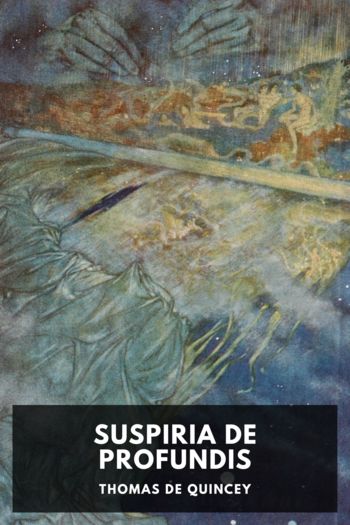Confessions of an English Opium-Eater by Thomas De Quincey (the rosie project txt) 📕

- Author: Thomas De Quincey
Book online «Confessions of an English Opium-Eater by Thomas De Quincey (the rosie project txt) 📕». Author Thomas De Quincey
With respect to the torpor supposed to follow, or rather (if we were to credit the numerous pictures of Turkish opium-eaters) to accompany the practice of opium-eating, I deny that also. Certainly opium is classed under the head of narcotics, and some such effect it may produce in the end; but the primary effects of opium are always, and in the highest degree, to excite and stimulate the system. This first stage of its action always lasted with me, during my noviciate, for upwards of eight hours; so that it must be the fault of the opium-eater himself if he does not so time his exhibition of the dose (to speak medically) as that the whole weight of its narcotic influence may descend upon his sleep. Turkish opium-eaters, it seems, are absurd enough to sit, like so many equestrian statues, on logs of wood as stupid as themselves. But that the reader may judge of the degree in which opium is likely to stupefy the faculties of an Englishman, I shall (by way of treating the question illustratively, rather than argumentatively) describe the way in which I myself often passed an opium evening in London during the period between 1804–1812. It will be seen that at least opium did not move me to seek solitude, and much less to seek inactivity, or the torpid state of self-involution ascribed to the Turks. I give this account at the risk of being pronounced a crazy enthusiast or visionary; but I regard that little. I must desire my reader to bear in mind that I was a hard student, and at severe studies for all the rest of my time; and certainly I had a right occasionally to relaxations as well as other people. These, however, I allowed myself but seldom.
The late Duke of ⸻ used to say, “Next Friday, by the blessing of heaven, I purpose to be drunk;” and in like manner I used to fix beforehand how often within a given time, and when, I would commit a debauch of opium. This was seldom more than once in three weeks, for at that time I could not have ventured to call every day, as I did afterwards, for “a glass of laudanum negus, warm, and without sugar.” No, as I have said, I seldom drank laudanum, at that time, more than once in three weeks: this was usually on a Tuesday or a Saturday night; my reason for which was this. In those days Grassini sang at the Opera, and her voice was delightful to me beyond all that I had ever heard. I know not what may be the state of the Opera-house now, having never been within its walls for seven or eight years, but at that time it was by much the most pleasant place of public resort in London for passing an evening. Five shillings admitted one to the gallery, which was subject to far less annoyance than the pit of the theatres; the orchestra was distinguished by its sweet and melodious grandeur from all English orchestras, the composition of which, I confess, is not acceptable to my ear, from the predominance of the clamorous instruments and the absolute tyranny of the violin. The choruses were divine to hear, and when Grassini appeared in some interlude, as she often did, and poured forth her passionate soul as Andromache at the tomb of Hector, etc., I question whether any Turk, of all that ever entered the Paradise of Opium-eaters, can have had half the pleasure I had. But, indeed, I honour the barbarians too much by supposing them capable of any pleasures approaching to the intellectual ones of an Englishman. For music is an intellectual or a sensual pleasure according to the temperament of him who hears it. And, by the by, with the exception of the fine extravaganza on that subject in Twelfth Night, I do not recollect more than one thing said adequately on the subject of music in all literature; it is a passage in the Religio Medici14 of Sir T. Brown, and though chiefly remarkable for its sublimity, has also a philosophic value, inasmuch as it points to the true theory of musical effects. The mistake of most people is to suppose that it is by the ear they communicate with music, and therefore that they are purely passive to its effects. But this is not so; it is by the reaction of the mind upon the notices of the ear (the matter coming by the senses, the form from the mind) that the pleasure is constructed, and therefore it is that people of equally good ear differ so much in this point from one another. Now, opium, by greatly increasing the activity of the mind, generally increases, of necessity, that particular mode of its activity by which we are able to construct out of the raw material of organic sound an elaborate intellectual pleasure. But, says a friend, a succession of musical sounds is to me like a collection of Arabic characters; I can attach no ideas to them. Ideas! my good sir? There is no occasion for them; all that class of ideas which can be available in such a case has a language of representative feelings. But this is a subject foreign to my present purposes; it is sufficient to say that a chorus, etc., of elaborate harmony displayed before me, as in a piece of arras work, the whole of my past life—not as if recalled by an act of memory, but as





Comments (0)